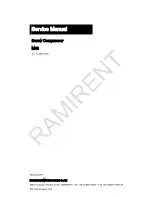
10 — ENG
D20414 Rev. 0 2/15/00
OPERATING PROCEDURES
1.
Before attaching air hose or accessories, make
sure the OFF/AUTO lever is set to “OFF” and the
air regulator is closed.
2.
Attach hose and accessories.
TOO MUCH AIR PRESSURE CREATES A
HAZARDOUS RISK OF BURSTING. CARE-
FULLY FOLLOW STEPS 3 AND 5 EACH
TIME THE COMPRESSOR IS USED.
Compressed air from the outfit may
contain water condensation. Do not spray
unfiltered air at an item that could be
damaged. Some air operated tools or
devices may require filtered air. Read the
instructions for the air tool or device.
3.
Check the manufacturer’s maximum pressure
rating for air tools and accessories. The regula-
tor outlet pressure must never exceed the
maximum pressure rating. If your compressor is
not supplied with a regulator with gauge, install
one before using accessories.
4.
Turn the OFF/AUTO lever to “AUTO” and allow
tank pressure to build. Motor will stop when tank
pressure reaches “cut-out” pressure.
5.
Open the regulator by turning it clockwise.
Adjust the regulator to the correct pressure
setting. Your compressor is ready for use.
6.
Always operate the air compressor in well-venti-
lated areas; free of gasoline or other solvent
vapors.
Do not operate the compressor near the spray
area.
When you are finished:
7.
Set the “OFF/AUTO” lever to “OFF”.
8.
Turn the regulator counterclockwise and set the
outlet pressure to zero.
9.
Remove the air tool or accessory.
10. Open the regulator and allow the air to slowly bleed
from the tank. Close the regulator when tank
pressure is approximately 20 psi.
11. Drain water from air tank.
WATER WILL CONDENSE IN THE AIR TANK.
IF NOT DRAINED, WATER WILL CORRODE
AND WEAKEN THE AIR TANK CAUSING A
RISK OF AIR TANK RUPTURE.
With tank pressure at approximately 20 psi, open the drain
cock or drain valve.
NOTE:
If drain cock valve is plugged, release all air
pressure. The valve can then be removed,
cleaned, then reinstalled.
12. After the water has been drained, close drain cock
or drain valve. The air compressor can now be
stored.











































